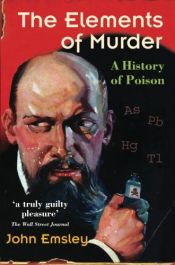The Elements of Murder: A History of Poison
Über
Was Napoleon killed by the arsenic in his wallpaper? How did Rasputin survive cyanide poisoning? Which chemicals in our environment pose the biggest threat to our health today? In The Elements of Murder, John Emsley answers these questions and offers a fascinating account of five of the most toxic elements--arsenic, antimony, lead, mercury, and thallium--describing their lethal chemical properties and highlighting their use in some of the most famous murder cases in history.In this exciting book, we meet a who's who of heartless murderers. Mary Ann Cotton, who used arsenic to murder her mother, three husbands, a lover, eight of her own children, and seven step children; Michael Swango, who may have killed as many as 60 of his patients and several of his colleagues during the 20 years he practiced as a doctor and paramedic; and even Saddam Hussein, who used thallium sulfate to poison his political rivals. Emsley also shows which toxic elements may have been behind the madness of King George III, the delusions of Isaac Newton, and the strange death of King Charles II. In addition, the book examines many modern day environmental catastrophes, including accidental mass poisonings from lead and arsenic, and the Minamata Bay disaster in Japan.
Written by a leading science writer, famous for his knowledge of the elements and their curious and colorful histories, The Elements of Murder offers an enticing combination of true crime tales and curious science that adds up to an addictive read.

 Deutsch
Deutsch English
English Español
Español










Mitglieder-Rezensionen Eigene Rezension schreiben
Schreibe die erste Rezension
Zum Kommentieren bitte Anmelden